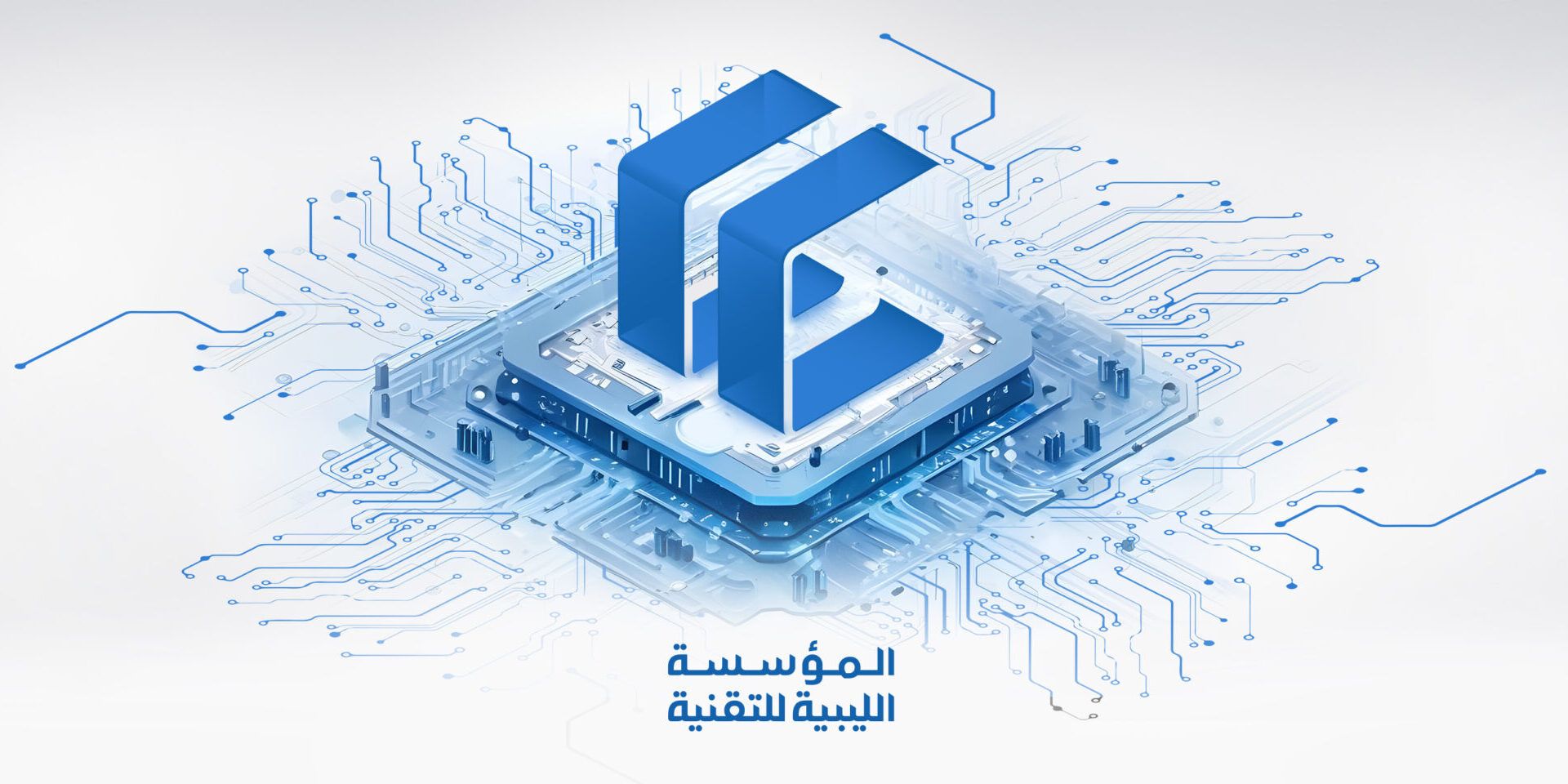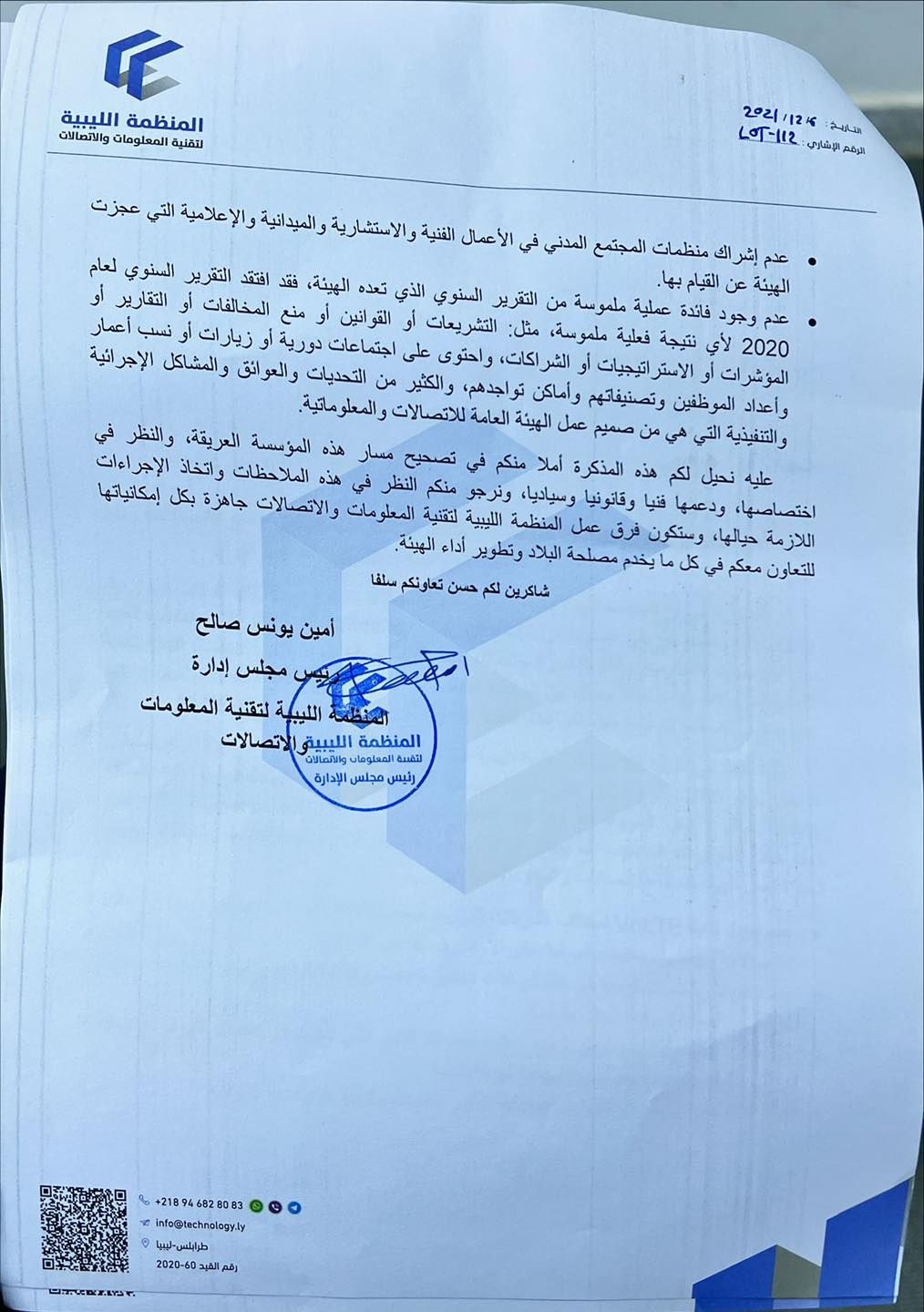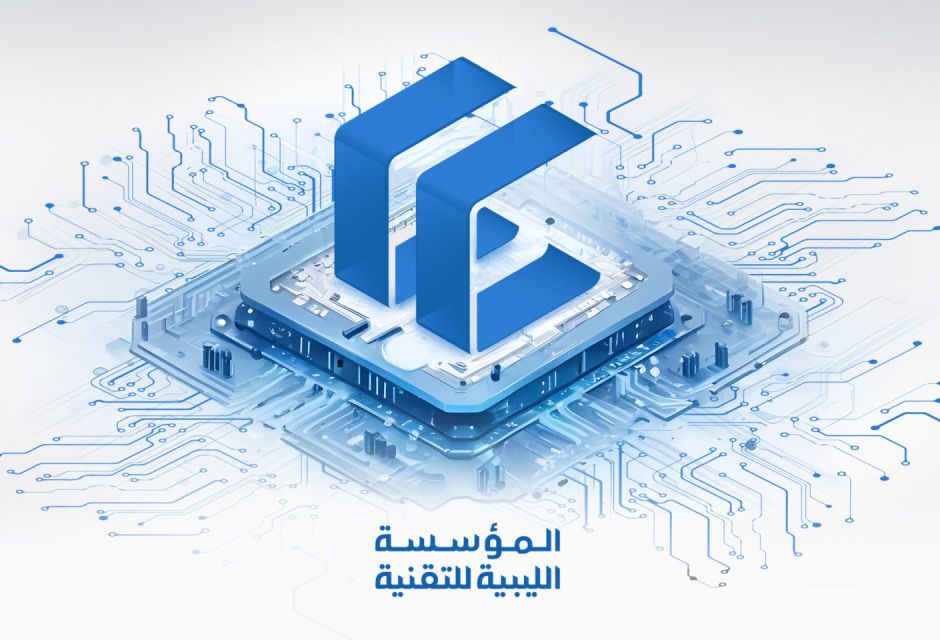Correspondence regarding General Authority for Telecommunication and Information
To General Authority for Telecommunication and Information
To Libyan Audit Bureau
To the Administrative Control Authority
After Greetings…
We salute you, the patriots and the competencies working up to this moment to preserve the telecommunications sector, and we wish the rest success in improving the telecommunications sector and services, and we are always of assistance to you.
Noting that the Libyan Organization for Information and Communications Technology was registered on 8/25/2020 with declaration No. 60/2020 and has membership in the Internet Society. It has worked with many governmental institutions, companies and local communities, in addition to the work of the Libyan Organization for Information and Communications Technology team. It is a link between government telecommunications companies, private companies, and society. The organization’s various teams also try to fill the gaps to enhance cooperation between various parties in the Libyan state.
Based on Article 26 of the regulations organizing the work of the Civil Society Commission, approved by Presidential Council Resolution No. 286 of 2019, which gives the organization the right to obtain information related to its activities in a manner that does not violate confidentiality, with the right to publish information and reports, the right to evaluate state institutions, and submit proposals. To develop it, some points became clear to us from the monitoring of the organization’s teams, consultants, partners, and think tanks of the work of the Communications and Informatics Corporation, which are:
- Failure to activate VoLTE technology for various companies providing call services, which contributes to improving the quality and bandwidth of communications and reducing pressure on previous generations of networks.
- Lack of support for government companies in concluding partnerships to launch MVNO services to be a companion product to telecommunications companies services and open doors to competition.
- The frequency spectrum is not regulated according to the regulations of an approved organization, which has caused many infringements, in addition to the fact that the frequency spectrum is a sovereign resource for the Libyan state.
- The stability of licenses in a way that made them not keeping pace with the development of technologies and how they work commercially and technically.
- Lack of seriousness in preventing counterfeit jamming and repeating devices, which has caused a deterioration in the services provided to citizens, and a commercial and technical imbalance among telecommunications companies (particularly voice calls).
- The executive regulations of Telecommunications Law No. 22 of 2010 and its accompanying regulations were not approved for a period of more than ten years, with deficiencies in performance and communication with the Council of Ministers.
- The Commission does not participate with institutions, companies, and think tanks in preparing the general email policy.
- The Authority takes a position of reaction against modern technologies such as fifth generation technology, data centers, and others.
- The lack of a clear, general strategy, and the absence of real stages.
- The inability to protect private companies in their business, competitiveness, and organization of work among them.
- The inability to adopt the status of judicial police officer to detect violations.
- Weakness in publishing reports, information, bulletins, periodicals and strategies.
- The lack of the Authority’s role in forums, conferences, workshops, forums and exhibitions as an effective organizing body in the communications and information sector.
- The very high staffing of the Communications and Informatics Authority, with no productivity indicators or outputs for this huge number in this sensitive facility.
- Lack of regulation of the work of providers of technologies, technical solutions, equipment, and devices, which has caused counterfeit, used and refurbished equipment to enter several sensitive and important facilities in the country.
- Lack of cooperation with various ministries on technical issues or establishing partnerships that support digital transformation.
- The Communications and Informatics Authority is isolated from the state in providing specializations and consultations.
- Not combating the monopoly that has existed for three decades in the telecommunications sector. Rather, the Authority has strengthened this monopoly by not deterring some major government companies from entering various sections of technology and communications other than their specialization.
- Failure to direct the necessary technical and legal correspondence to organize work in various state institutions, including cybersecurity recommendations, use of licensed software, and awareness of internal regulations.
- The lack of a clearly defined strategy for addressing its projects and postal services.
- Failure to update the e-government strategy and Libya’s digital or electronic projects.
- Some bodies, institutions, ministries, and companies infringed on the authority’s powers, because of the absence of public relations, communication, integrated work, and the embodiment of the spirit of cooperation in institutional work. In fact, most state institutions avoided authority.
- Failure to involve civil society organizations in the technical, advisory, field and media work that the Commission was unable to do.
- There is no tangible practical benefit from the annual report prepared by the Authority, as the annual report for 2020 lacked any actual tangible result, such as: legislation, laws, prevention of violations, reports, indicators, strategies, or partnerships, and it contained periodic meetings, visits, or age percentages. Preparing employees, their classifications, and their locations, and many challenges, obstacles, and procedural and implementation problems that are at the core of the work of the Communications and Informatics Authority.
Therefore, we forward this memorandum to you in the hope that you will correct the course of this ancient institution, consider its jurisdiction, and support it technically, legally, and sovereignly. We ask you to consider these observations and take the necessary measures regarding them, and the work teams of the Libyan Organization for Information and Communications Technology will be ready with all their capabilities to cooperate with you in everything you do. It serves the country’s interest and develops the authority’s performance.
We thank you for your kind cooperation in advance
Amin Younis Salih
Chairman of Board of Directors
Libyan Organization for Information Technology and Telecommunication








Leave a Reply